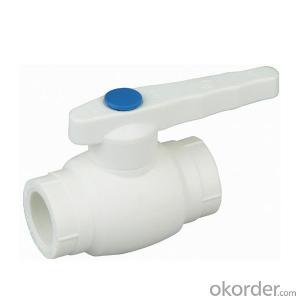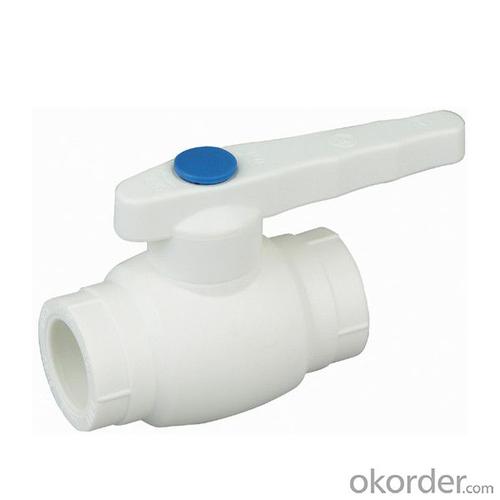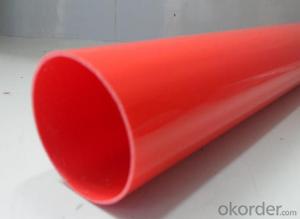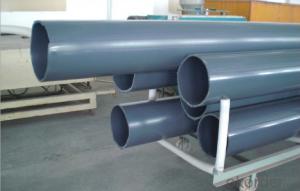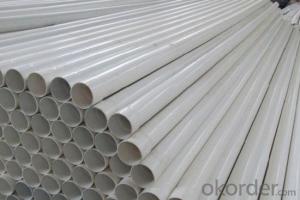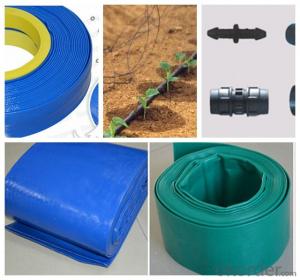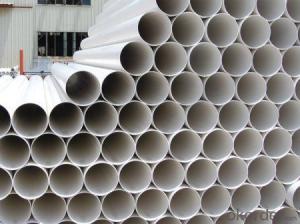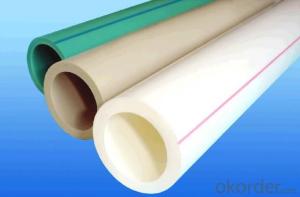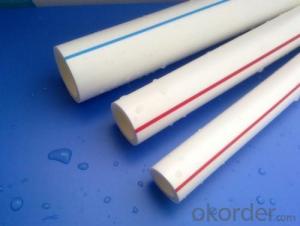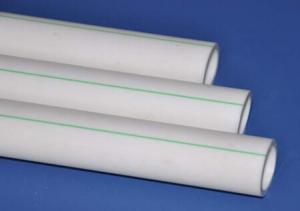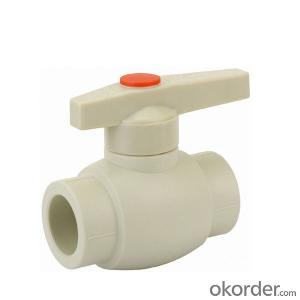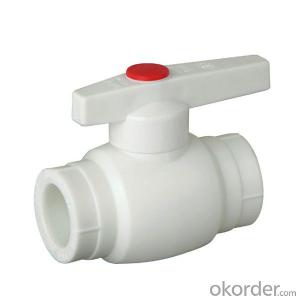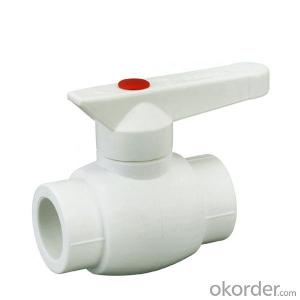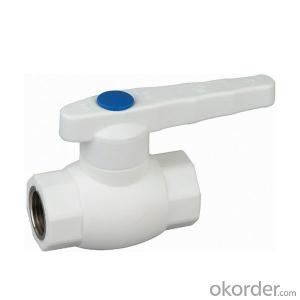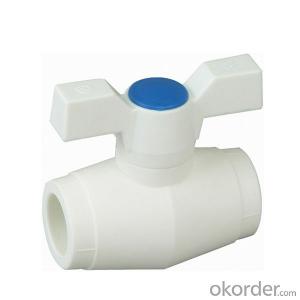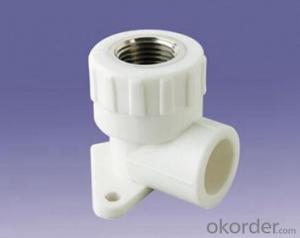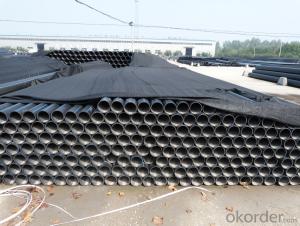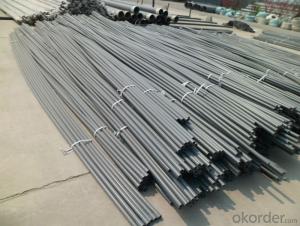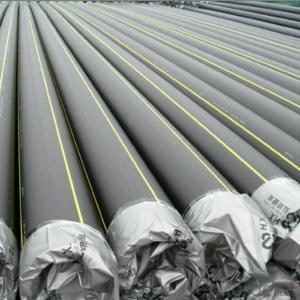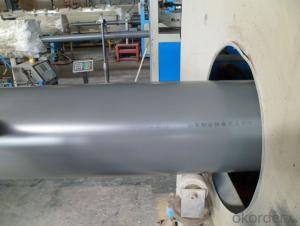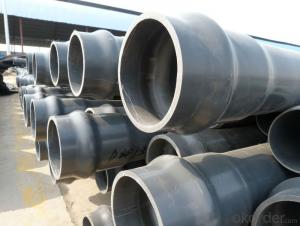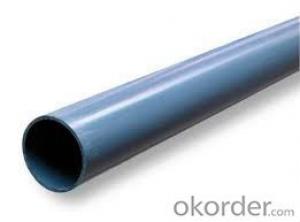Plastic Tubes PPR A1 Hot Melt Copper Core Ball Valve
- Loading Port:
- China main port
- Payment Terms:
- TT OR LC
- Min Order Qty:
- 1000 carton
- Supply Capability:
- 100000 carton/month
OKorder Service Pledge
OKorder Financial Service
You Might Also Like
Product Description:
Quick Details
Material: Plastic
Technics: Injection
Type: Valve
Place of Origin: Zhejiang, China (Mainland)
Model Number: DSW358-363
Connection: Welding
Shape: Equal
Head Code: Round
Standard: ISO,DIN,EN,MSS,API,BS,ANSI
Certification: ISO9001,CE
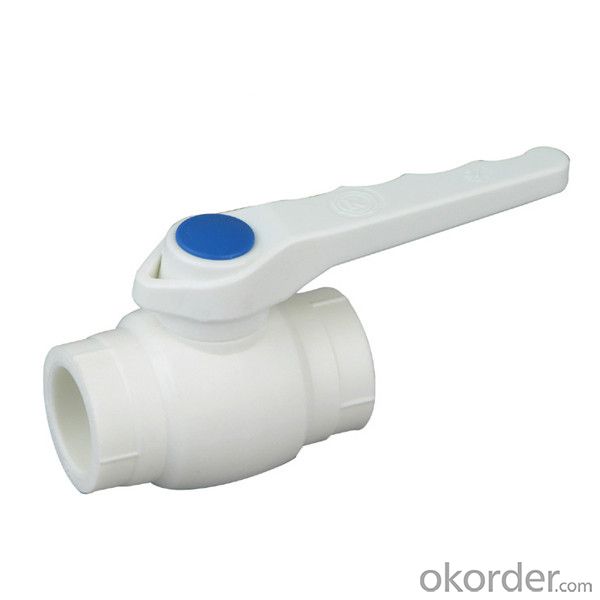
Specifications
Standard: DIN8077/8078
Material: R200P from Korea
Packaging & Delivery
Packaging Details:
1. Large carton:515x400x220 Cubage:0.04532 M3
Small carton:390x255x250 Cubage:0.0248 M3
2. PE poly bag+ cartonDelivery Detail: 15 days/ 20" container; 25 days/ 40HQ
Our Advantages:
1) Healthy, bacteriological neutral, conforming to drinking water standards
2) Resistant to high temperatures, good impact strength
3) Convenient and reliable installation, low construction expenses
4) Excellent heat-insulation property from minimum thermal conductivity
5) Lightweight, convenient to transport and handle, good for labor-saving
6) Smooth inner walls reduce pressure loss and increase flow speed
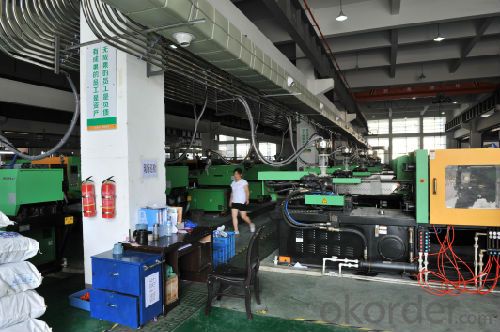
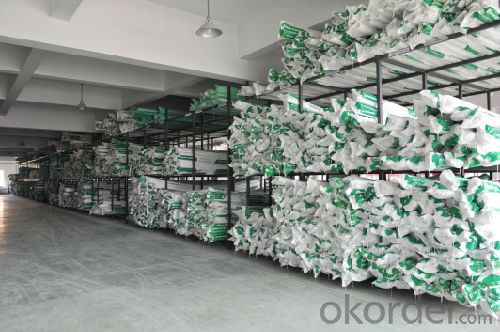
FAQ
Q1:How can i get a sample?
A1: You can get samples by communicate with our export sales.
Q2:How long is delivery?
A2:Delivery time will be 30-45 days according to order quantity.
- Q: I want to know if my golden hamster is to big to run through the plastic tubes they give you at the stores because I'm getting him a new cage.
- Well, I don't think you should BUY any plastic tubes, get some cardboard toilet ones, my mice love it , they go in and out all the time and try to climb over (they can't, lol) Hamsters will fit in just about, but don't spend lots of money on buying that, test it with toilet tubes first... good luck!
- Q: Can plastic tubes be easily cut to size?
- Yes, plastic tubes can be easily cut to size using a variety of tools such as scissors, utility knives, or tube cutters.
- Q: Plastic pipes have steam, how to handle dry?
- We like PC plastic pipe is the use of air blowing dust, water vapor will suggest that you try the effect
- Q: Can plastic tubes be used for household products?
- Yes, plastic tubes can be used for a variety of household products such as toothpaste, lotions, creams, and even food items like sauces and condiments.
- Q: Im looking for some hard plastic tubes like pvc, but clear about 3 ft in length. Any stores that might have something like that?
- Check your local hardware store, or you can find them at the arts and crafts stores. If you are in nyc I would send you down to china town, to go into a store called pearl paint. Check to see if you have one near by, they have everything you need! Hope that helps!
- Q: I am building a cold air intake and I am wanting like a clear plastic tubing kinda like clear pvc or aluminum tubing. thanks!!! near tulsa preferably
- Online and they have everything.
- Q: Can plastic tubes be used for ventilation systems?
- Yes, plastic tubes can be used for ventilation systems. They are commonly used in various applications such as HVAC systems, air conditioning units, and even in industrial ventilation systems. Plastic tubes offer several advantages such as being lightweight, durable, and resistant to corrosion, making them a suitable choice for ventilation purposes.
- Q: What are the advantages of using plastic tubes in the agricultural packaging industry?
- Plastic tubes offer several advantages in the agricultural packaging industry. Firstly, they provide excellent protection against moisture, insects, and other external factors that can damage or contaminate agricultural products. Secondly, plastic tubes are lightweight and durable, making them easy to handle and transport, reducing the risk of damage during transit. Additionally, plastic tubes can be easily customized in terms of size, shape, and color, allowing for efficient branding and product differentiation. They are also cost-effective compared to other packaging materials, making them a preferred choice for agricultural packaging.
- Q: A piece of plastic tubing is 19 inches long and must be divided into 6 smaller pieces each at least 2 inches long. What is the largest length of tubing possible?
- the small ones are all 2 so 5 x 2 is10 19 minus 10 is 9 it is 9
- Q: I have lots of hamster space all connected with tubes, and each area is colorful and some have wires. I have had hamsters in the past, but never more than one at a time. I want another hamster to replace the one I had for almost 4 years but then passed away. The thing is, I don't know if I should get more than one hamster at the same time, and also I don't know what kind of hamster/s I should get. Please help!
- Firstly, there is no such thing as a Teddy Bear Hamster. There are either Dwarf Hamsters or Syrian Hamsters. Teddy Bear, Fancy Bear, Panda Bear, Golden, Candy, Black Wolf, etc are just some fake names given to different coloured Syrian Hamsters to sell them at different prices. They are all the same, belonging to the Same Species. Now that I cleared that up, It depends on what you want. ?Dwarf hamsters, they are small and usually they like living in a group of 2 or 3. If you want more than one hamster, then you should go for Dwarf Hamsters. However, usually the Dwarf hamsters tend to bite ad trust their owners less, or hide when the owners approach unless they've gotten used to the owner. It may take a long time to tame them. There are exceptions, that's why I quoted the word usually. ?Syrian hamsters are of the large variety, with 2 kinds. Some have long fur and some have short fur. (The long haired Syrians are often falsely termed as Teddy Bear Hamsters). Syrian hamsters CANNOT be kept in pairs. They prefer to have their entire territory to itself. Any other hamster (considered as intruder) will definitely cause them to attack each other. I've seen it happen. The fights can be very dangerous, which can even lead to death. On the brighter side, Syrians are more friendly towards their owners and easier to tame. Yes, they do bite, only at first. They'll no longer bite once they get to know their owner. I've had 4 Syrian hamsters who loved to get out of their cages and climb on my bed and walk over me. I'd recommend ONE Syrian hamster. If your cage is large enough, the hamster will be very happy, assuming food and water being supplied and some quality time spent. (_( (=' :') --<I ? U (,()() ? -?o?'? ????-? ?- -β??? ??????- -? ?-★ ?ǐvǐ?? Я?? ★-? ??????????
Send your message to us
Plastic Tubes PPR A1 Hot Melt Copper Core Ball Valve
- Loading Port:
- China main port
- Payment Terms:
- TT OR LC
- Min Order Qty:
- 1000 carton
- Supply Capability:
- 100000 carton/month
OKorder Service Pledge
OKorder Financial Service
Similar products
Hot products
Hot Searches
Related keywords
